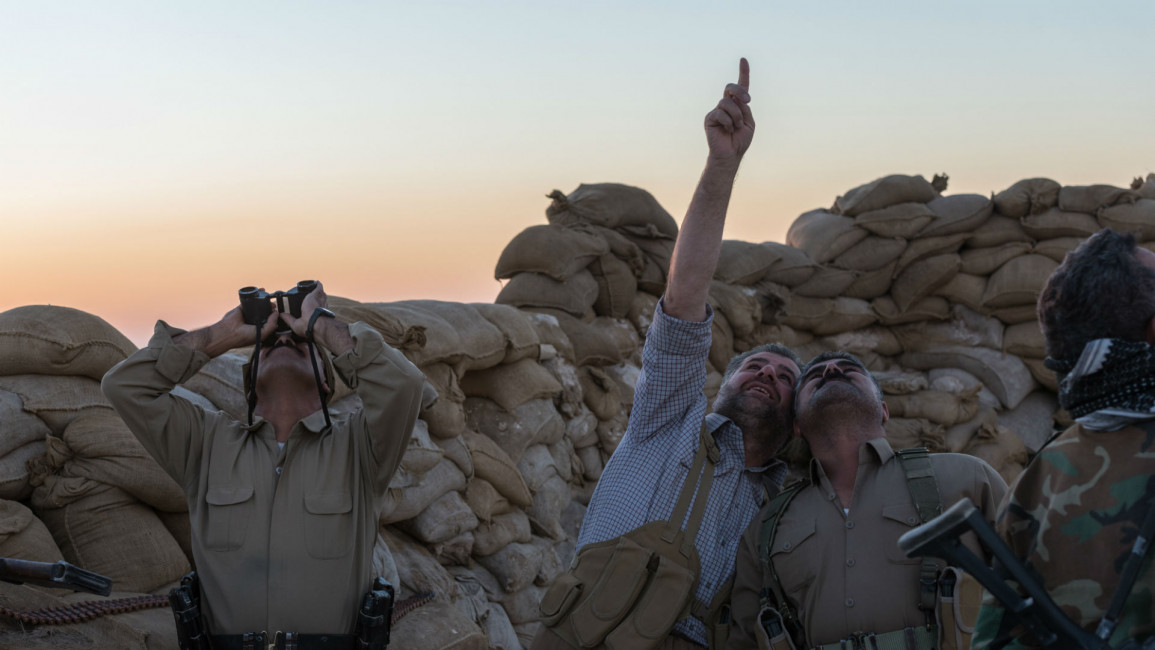IS weaponise drones and bring terror to Mosul's skies
The Islamic State group have started to weaponise drones, and in the latest incident dropped a grenade on Iraqi forces advancing in the city of Mosul.
It exploded on the roof of a building where Iraqi police forces were sheltering as they advanced some 10 kilometres (six miles) south of Mosul, the last IS-held Iraqi city.
No one was injured, according to an Iraqi officer, but the incident nonetheless represents another escalation in the war of commercially available drones that is playing out as Iraqi forces battle the militants.
Masters of invention, IS jihadists have booby trapped household appliances and turned cars into armoured suicide bombs as they try to hold back Iraqi forces advancing on the city.
They have also made their own make-shift drones with wood and flown devices rigged with explosives into troops.
Along with armed drones, they have been used by IS technitions to spy on their enemies.
"We have recorded three incidents," police Lieutenant Colonel Hussein Moayyad told AFP.
They appear to have used an add-on - similar to those intended to help fisherman drop their hooks farther out at sea - to release the drone's payload, Moayyad said.
They rig the grenade so the pin is pulled free when the explosive device is dropped, arming it.
Booby trap
According to a US defence official, the incident unfolded on 2 October when a small plane with a styrofoam body was either shot down or crashed in Erbil in northern Iraq.
Two Iraqi Kurdish peshmerga fighters grabbed it and took it back to their camp to inspect and photograph it, when it blew up.
IS is flying drones to spy on Iraqi forces -- so Iraqi forces are sending up their own devices to spot the enemy as well.
— Jonah Leff (@jonahleff) November 8, 2016" style="color:#fff;" class="twitter-post-link" target="_blank">Twitter Post
|
Moayyad watched a screen inside a specially converted armoured bank van he has turned into a mobile drone control centre.
"Now I am entering the dangerous zone, this is where [IS] is," he said.
Like the IS operation, the Iraq police have also cobbled their drone programme together with shop-bought equipment and ingenuity.
Fighting back
Moayyad - who has a masters degree in computing - modified drones bought in Dubai and Turkey to give them greater range, longer battery life and the ability to film at night.
When he spots enemy movement, he coordinates with the Iraqi artillery, air force or sometimes the US-led coalition bombarding IS from the sky.
In eastern Mosul, Iraqi special forces soldiers are using drones for the same purpose.
"There were three car bombs coming out from al-Bakr toward our positions that we spotted with our drone and hit with our tanks," Staff Lieutenant Colonel Muntadhar Salem recently told AFP, referring to an area in the city.
In total, Moayyad said, the Iraqi police force drones - superior to the ones IS use - end up costing somewhere around $26,000.
But despite having superiority over the jihadis, he said the Iraqi forces could do with equipment that can let you take control of unknown drones, especially now that IS is arming them.
"Maybe they could get bigger drones," Moayyad said.
"And if they manage to use chemical weapons on them, then this is more scary, of course."



